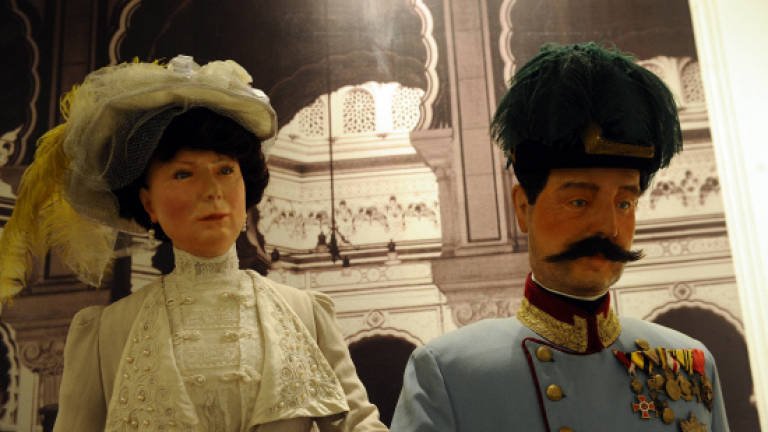Where it all started: Sarajevo and World War I

SARAJEVO is no stranger to conflict, but while the wounds of the Bosnian war's siege are still raw, the city is seeking to cash in on its historical claim as the place where World War I was ignited.
On June 28, 1914, the assassination of the heir to the Austro-Hungarian empire Archduke Franz Ferdinand and his wife by 20-year-old Serb nationalist Gavrilo Princip was the spark that set off the Great War, and the 100th anniversary of that event will be commemorated in Sarajevo.
"There is a huge interest in the period when the centenary will be marked -- from tour operators, major media," Sarajevo tourist board spokeswoman Asja Hadziefendic Mesic told AFP.
The Bosnian capital in June will host several historical conferences, as well as concerts, exhibitions, plays and a 'Peace Ride' expected to gather thousands of bikers from around the former Yugoslavia.
In central Sarajevo, where many late 19th-century buildings from the Austro-Hungarian era -- including the stunning neo-Moorish National Library that Franz Ferdinand was on his way back from when he was shot -- have survived, some local businesses have seized the opportunity.
A 33-year-old woman timed the launch of her World War I-themed boutique hotel "Franz Ferdinand" to coincide with the run-up to the anniversary.
"People know of Sarajevo from its siege in the 1990s and the 1914 assassination, which both attract tourists from the whole world," Emela Burdzovic, a former journalist, told AFP.
While the Great War (1914-1918) was triggered in the Bosnian capital, Sarajevo was not the scene of fighting during that conflict.
It remains scarred however by Bosnia's inter-ethnic conflict (1992-1995) and the 44-month-long siege by Serb forces who heavily bombed the city and killed around 10,000 people.
Burdzovic's hotel is located near the Sacred Heart Cathedral, in an early 20th century building with a weatherworn yellow facade.
A giant portrait of the moustachioed Archduke Ferdinand, with a melancholic gaze and in full military dress, welcomes visitors into the lobby.
The rooms are named after people and places associated with World War I: the murdered royal couple -- Franz and his wife Sophie, the assassin Princip, his organisation 'Mlada Bosna' ('Young Bosnia'), as well as some famous battlefields such as Gallipoli and Verdun.
Huge photographs of the conflict's best-known leaders and battles loom over the beds and other decoration includes Great War trivia printed directly on the walls.
Burdzovic was quick to stress that the in-room history lessons were based on "facts only".
'A lot of controversy'
With the centenary approaching, the archduke's assassination has stirred up passions again across the Balkans, where wildly differing interpretations of history endure.
For Serbs, Princip was a hero wanting to "liberate" them from the Austro-Hungarian occupier, but for Bosnia's Muslims he was a terrorist.
But the debate over the motives behind the assassination that touched off the Great War is good for business, Burdzovic said.
"We have chosen an event which provokes a lot of controversy ahead of the centenary," she said.
The Franz Ferdinand is already fully booked for late June, when the commemoration event will take place.
The young hotelier is not the only one hoping to thrive on Sarajevo's fateful claim to fame but others have opted to play up some more anodyne aspects of Bosnia's 40 years as part of the Austro-Hungarian empire.
Adnan Smajic named his tearoom "Franz & Sophie" in a homage to, before it ended with the opening shots of the war, what was considered one of the most remarkable royal love stories of the time.
"They are historic figures who left a mark on this city and whose lives brought changes to what was at the time a very traditional and conservative Europe," said the doctor turned tea sommelier.
Franz Ferdinand defied customs and massive court pressure to wed Sophie Chotek, a Bohemian aristocrat of lesser social rank, in what is known as a left-handed marriage.
"All these people who are caught up in ideological disputes should drop by to have a cup of tea and discover that it is possible to talk about that era from another perspective," Smajic added with a smile.
There is however at least one hotel manager around Sarajevo who wants the whole centenary craze to be over and that's Gavrilo Princip himself.
Not the real one -- who died in prison months before the end of the war he helped trigger -- but his namesake and descendant.
In the small hotel he runs in a Sarajevo suburb, the 61-year-old -- whose grandfather was the assassin's brother -- let his exasperation show as he picked up his cigarettes and left the room, ruling out any interview.
"Yes, I really am Gavrilo Princip and I don't know how I'm going to get through the year!". – AFP